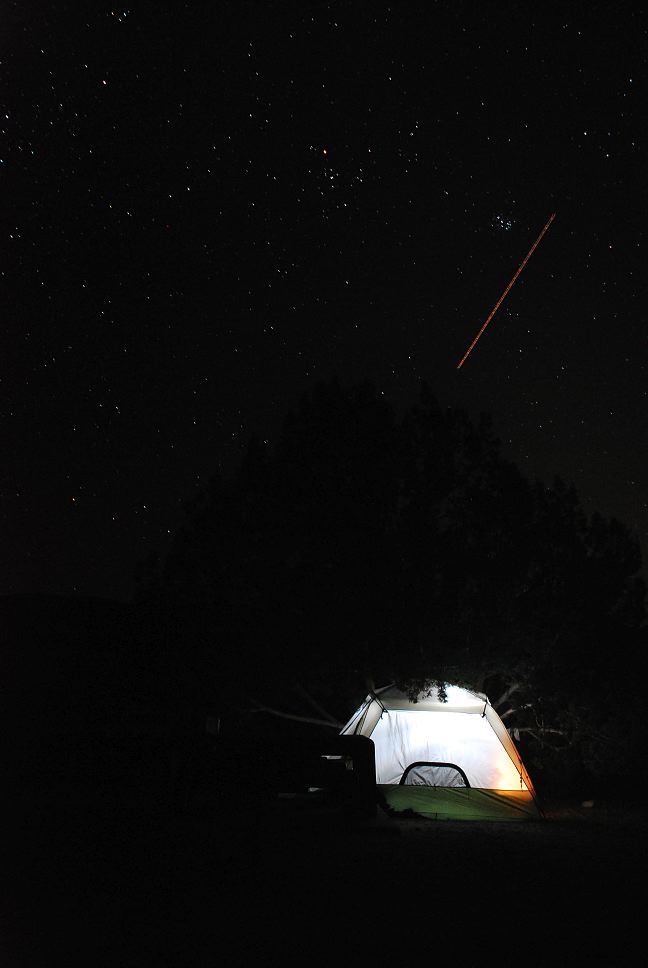The Progression
The Progression
From the Mundane to Whitehouse
March 21, 2009
Some places have more meaning than others, more value, more importance, more history, more memory, more endurance, more everything. Places like Canyon Country. Red Rock Country. Abbey Country. I was going there again for another romp to celebrate the beginning of Spring, that season of renewal and rebirth in which all things seem once again possible and the only limitation is on your imagination. Even if you can't ever achieve what your imagination dreams up, and I have an active one, the simple ability to believe that it might happen, that it might come true, that in fullness of time one can, through diligent effort, grasp what the mind and spirit strive for, this belief is the essence of hope and is the reason for smiles worldwide. It seems to be strongest in the Spring, when the Earth itself is beginning its own cycle of renewal after a long sleep. We are products of the natural world, no matter how much we and are society and our culture try to deny it.

There are other special places in the world. Unlike Abbey Country, which is has value simply because of what it is, these places are important because of our individual relations to them. In 2003 I stepped out of BMW SUV that was thumping out Mozart, filthy and stinking (I had walked there from Mexico), and marveled at the town of Cascade Locks. Now, Cascade Locks, for most people, isn't a whole lot to look at and there is less to marvel at than the last sentence might suggest. But for me, for the individual who had been living in the woods and deserts and mountains that make up the Pacific Crest Trail, it was momentous.

I had learned, very clearly, what was important in my life, the difference between necessity and luxury, and was able to go of what didn't really matter. Walking for 2100 miles, with another 550 to go, has a way of doing that to you. But Cascade Locks mattered deeply to me not so much because of the unlimited town town food that I could eat, or all the beer I could swill, or the soft places to sit, or the roof over my head, or the warm bed to sleep in. From Cascade Locks I could see the end of the Beautiful Thing. From the banks of the Columbia I could see Canada and the end. I knew that in less than 3 weeks I would be back at home in Indiana, where all I had was my job and my stuff, things that no longer held much value.

Back in August of 2003 the SUV dropped me in front of the Salmon Row Pub where I drank two pints of Walking Man IPA and ate a large pizza while waiting for Birdie to arrive. The pub had changed hands since then and was now the Pacific Crest Pub and Hostel, and the new owners were doing a fabulous re-model of the aging establishment. I had visited the new place on the way down to Abbey County last spring and the joint was looking good. I ordered a pint of Walking Man and wandered around looking at the photos and postcards that hikers had sent after finishing the trail. But mostly I sat and went back to the time I had walked across the Bridge of the Gods, crossed the Columbia, and started the End.

I ate the soup and sandwich that came out, enjoying every last bit of the smoked salmon chowder, and drank a second pint. My life changed dramatically after I finished the PCT and returned to Bloomington. I left my career and moved to Washington to focus on walking a path different from that which was on. The PCT wasn't the start of the change. Rather, it was the event forced me to no longer pretend that the change wasn't taking place. The PCT marked the end of the illusion. I finished my beer, paid, and wandered out to have a look at the town and gaze at the mountains on the other side of the Columbia. In six months hikers would be moving through them on their own journey. They, too, would realize the end was near and that changes had taken place that can't be undone. It is the nature of the activity. You can't avoid it.

The interstate fly by outside of the sealed pod of my car. I raced along the Columbia, passing the numerous dams on the lower Columbia and then up into the Blue Mountains, the last significant mountain range on the Oregon Trail and, before the Barlow Trail along the flanks of Mount Hood was built, the last danger for the pioneers. I stopped in Baker City and toured around the downtown area, well off from the interstate garbage near the on/off ramps of the interstate. A local grubbery, The Oregon Trail Restaurant provided me with a unique sandwich: The Dave Burger. The monstrosity consider of a hamburger, a breaded and friend chicken breast, a thick slice of ham, crispy bacon, several slices of cheese, tomatoes, onions, pickles, lettuce, and a bun. With fries it cost something like $7.
Although I still had strength in me to drive, I pulled up at Farewell Bend State Park, a convenient sleeping point, especially as the next state park was 150 miles away in Idaho. I crept quietly past the campground host, secure in his hermetically sealed RV, and found a campsite. I tossed out a ground cloth and a sleeping bag and called it good. I swilled Steel Reserve and read Solzhenitsyn as the sky got black and the stars came out. The cheap, strong beer had predicable results and after six cans I was feeling fine enough to pretend to be an artist. I had tossed my tripod into the trunk of the car at the last minute and with it, I decided, I'd shoot the stars. What better, higher photograph could you take? Since each exposure was for 30 seconds, I went through another two cans of beer before calling the twenty or so shots I took enough. Take a careful look at the below photo. There is more to it that you'll probably see at first glance. Pretensions to artistry.
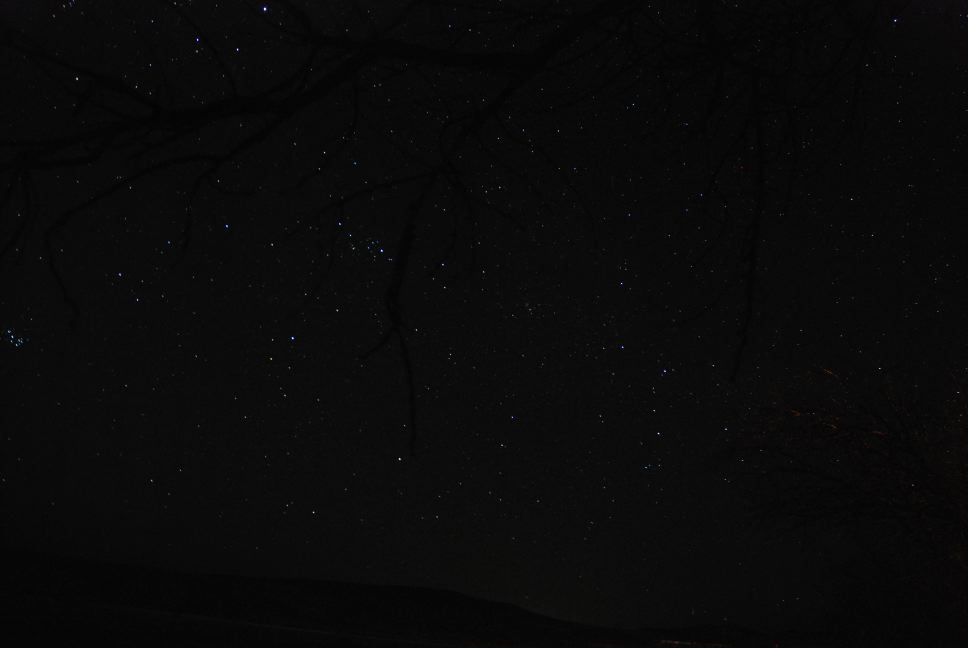
This is a more conventional photo of the night sky, but I like it anyways and is a bit easier to figure out than the previous one. The streak of light across the bottom of the page are from the headlights of cars driving by on the interstate. I'll spare you the photos of the bathroom being lit up by tungsten lighting or the flickering glow of the televisions inside various RVs.
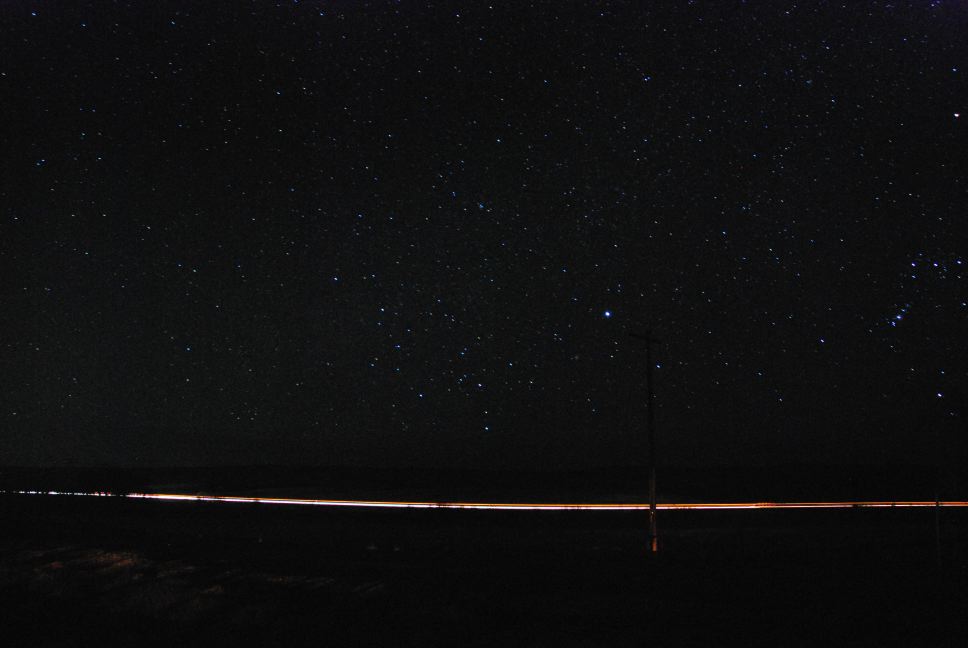
I was out of the state park before the campground host could find me and sped down the interstate into the blankness of southern Idaho. I couldn't pass up a stop in Wendell, the hometown and birthing place of The Great Destroyer. I'd never been to Wendell before, but rolling through the cow-town I suddenly understood TGD a lot more.
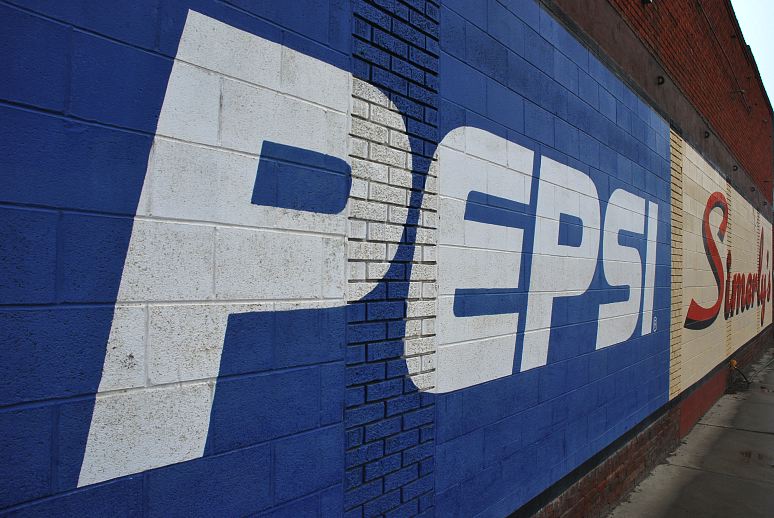
Wendell isn't a large town, and there isn't a lot to do other than ranching and shooting at traffic signs. And chick racing, but I'm not entirely sure what that is. Wendell has been around for a century and is a working town, not a sissy vacation-resort town for wealthy people from California, like Sand Point. The air smells of cow from the nearby feedlots of Jerome, the stores and shops are there to service the ranching and farming industries, and people drive pick up trucks that are clearly used for work, rather than commuting to an office job. There isn't a Starbucks in sight and the fanciest beer I could buy was Natural Ice. I was pretty confident that I could find an excavator for rent within about three minutes.
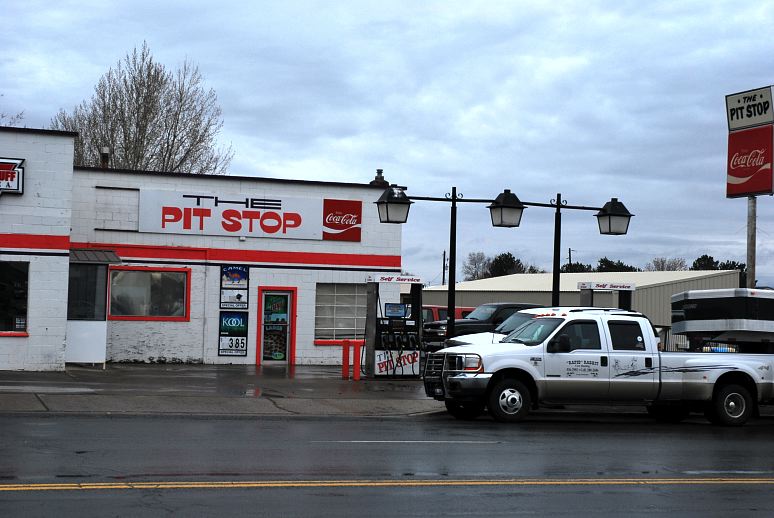
After getting gas and talking with a few locals at a gas station, I wandered around town for a bit, enjoying a respite from the monotony of the interstate. I was hoping to meet The Farmer's Daughter that TGD had told me so much, but hoping to run into her on the street wasn't very realistic. Besides, I didn't even know her name, and she was now married. Still, she would have some dirt on TGD and I walked down to the other side of the tracks hoping.
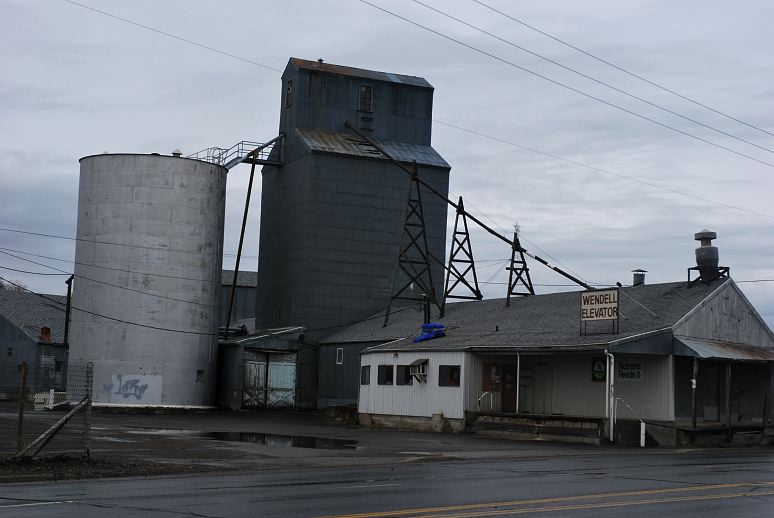
The Magic Valley sped past as town after town went by my windows. A storm hit, forcing me to slow down and drive conservatively through thickly falling, but not sticking, snow. I blazed through Twin Falls and Snowville and began the descent down to the the Salt Lake Valley, still in the storm. I had a side trip to make to visit the world headquarters of ULA. By that I mean Brian Frankle's garage in Logan, Utah. Andrew and I had stopped in for a visit on the way down to Buckskin Gulch and had managed to spend most of the day just talking. Simple conversation. You know, that thing that people used to do before television and the internet and twitter and blogs. News of friends and their travels. Ideas for trips. Politics. The state of industry in southeastern Colorado. And, of course, insider information about the gear industry. Although Brian may be hopping mad about it when he reads this, I snapped a photo of his latest, absolutely top secret product. and my ego requires me to publish it. So that Brian may forgive me, I won't give all the details as to what it is, but will say that it solves a critical, but under-thought about problem that desert hikers face in the digital age. Current weight is 1.78 ounces, before options, and it will be demoed at ADZPCTKOP2009. Aspiring PCT hikers might be able to carry one for the southern California section of the trail, but will need to inquire at the ULA booth at that time. Make sure to email or call Brian and ask about it if you can't wait until then.
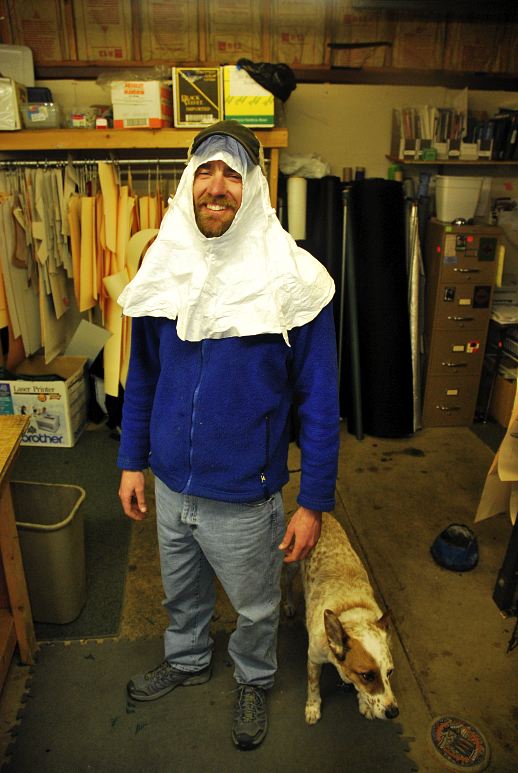
After a big breakfast I left Logan and pointed the car south. The ugliness of the Ogden-Salt Lake City-Provo megaplex was as astounding as ever. Given the predisposition of the LDS to prudishness, I was surprised at the number of massive billboards with scantily clad, busty, nubile young women. Every few miles there was a close up shot of a woman in a bikini, or the mid-rif of a girl in low cut jeans, or the backside of a woman in a thong. Billboard after billboard after billboard was selling sex. The product? Invariably liposuction or cosmetic surgery of some kind. Nothing like that in the godless northwest. I was relieved when I finally left Provo and started to enter the empty southern portion of the state.
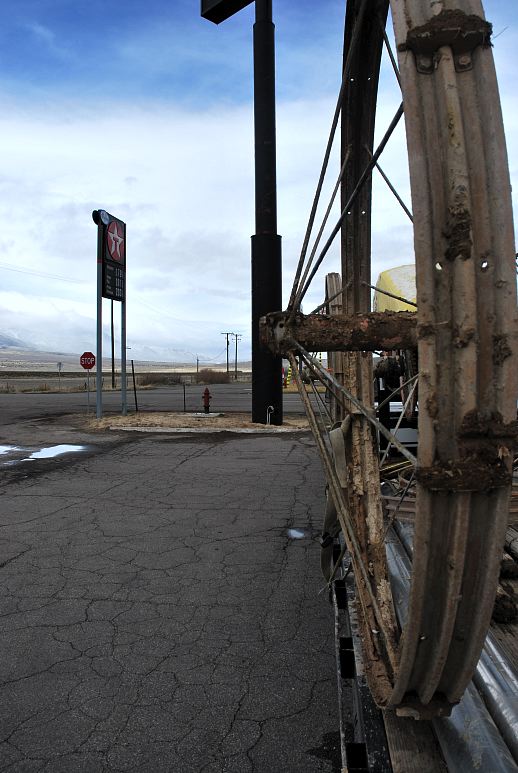
Utah, like New Orleans, is like going to a different country. The customs are different, the names are different, and people look on life in a radically different way. The Salt Lake Valley holds the majority of the population and once you clear it, the state is essentially rural, conservative, and functional. Not much will grow there, except cattle, even with water from irrigation projects. Resource extraction forms part of the local economy, as does energy generation via coal fired power plants, but there just isn't a lot of large scale commerce taking place. Rampant consumerism seems to have passed over southern Utah.
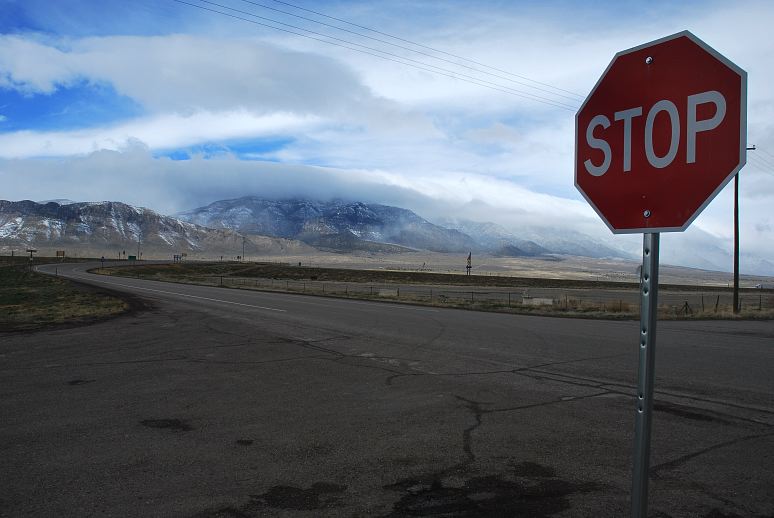
Once you get far enough south, however, you begin to encounter the tourism industry for the national parks of Utah. Quite frankly, all of the land south of I-70 in Utah could be considered a national park, but I'm glad it isn't. The parks concentrate the industrial tourist industry in a few places and keep the riff-raff out of the rest. I'll never get a chance to see Zion or Bryce Canyon or Arches in the way that I'd like to (on foot and without RVs around), but there is so much other good stuff on public lands that this doesn't seem to be too much of a compromise. Of course, the good stuff gets strip mined or buried under the silt of a dam, but things are looking better now, rather than worse.

I stopped in Kanab for dinner at a typical tourist dive where the waitresses call you pardner and carry fake six shooters on their massive leather belts (complete with dinner plate faux silver belt buckle). I should look at a place before I wander in, but what fun would that be? Kanab is one of the launching places for tourism in southern Utah, the season for which, fortunately, doesn't start for another few months. I especially like Kanab as back in 2006 the owner of Linda's Cafe had done something nice for me. I had stumbled in bleary eyed and cold from a frigid night spent camping by the side of the road. I looked down on my luck, poor, unemployed, beat. She offered me a thick discount on my huevos rancheros and coffee, wanting to help out a person she thought needed it. I've tried to go back to Linda's several times, but it has always been closed.
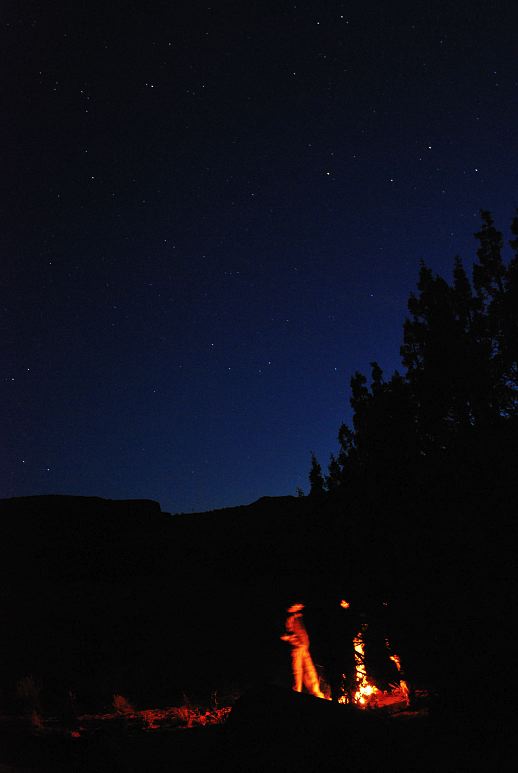
I set up camp (i.e, put out a sheet of plastic under a juniper tree and tossed my sleeping pad and bag on top of it under) at Whitehouse campground, a plain, but complete BLM site. There were perhaps a dozen others camping here, waiting to start a trip into Paria canyon, or Buckskin Gulch, or just hanging out for a few days before pushing on to somewhere, nomads with no fixed address, no job, and a lot of hope. That's the beauty of public lands: There is space for all of us.
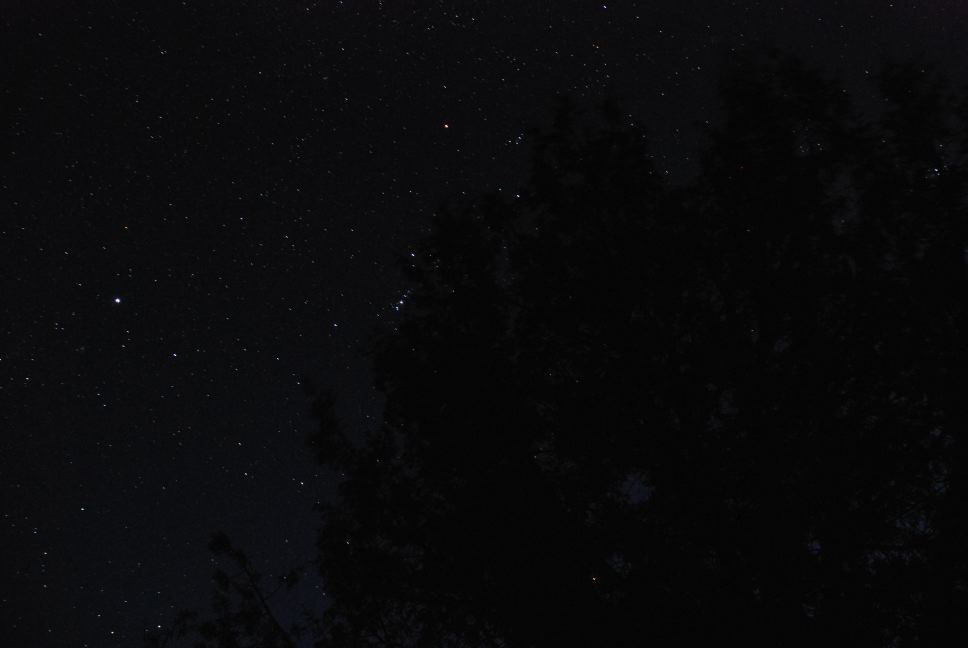
I read Abbey for a while and drank Steel Reserve as the stars came out. When it was dark enough, I turned off my headlamp, put down my book, and simply sat and looked at the stars overhead. The canvas of stars is something that used to be enjoyed by all, but now is only available to those who venture away from the light pollution of urban centers. The night sky brought us stories and tales and hope for the future and of something larger than ourselves. A better place, a better time. A place to dream and think and ponder and imagine. This is one more thing that we as a people (and by that I mean the human race, not just Americans) seem to have decided to sacrifice in the name of progress. And so I sat and watched the night sky while I drank cheap beer, for I didn't have the opportunity for this particular treat every night. No, this was special, and it was something to be enjoyed while it lasted.
